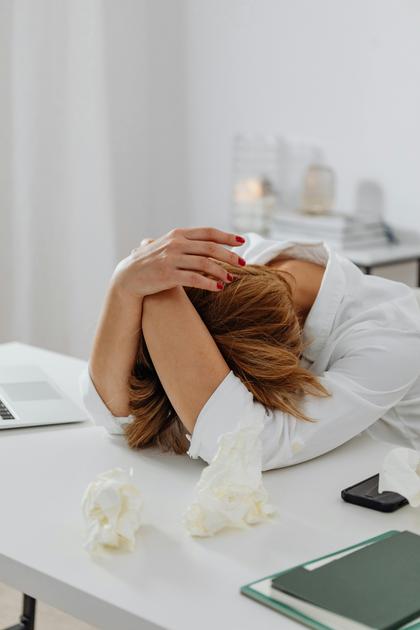Many women over 30 find themselves caught in a cycle of anxiety, hormonal imbalances, and sleepless nights. Understanding the deep-rooted connection between these factors is crucial for reclaiming your peace and rest. In this article, we will explore how fluctuating hormones can contribute to increased anxiety, leading to sleep disturbances that can feel overwhelming. But you’re not alone on this journey, and there are ways to manage it.
As we navigate through these challenges, it’s essential to recognize that addressing the anxiety, hormones, and sleep connection can pave the way towards a more balanced and fulfilling life. Let’s dive deeper into the information that can empower you.
The Calm Reset — 7 Days to Feel Steady, Kind & In Control Again - Only $2.99
Gentle guidance trusted by our community.
See how many women are solving this without heavy medications.
Understanding Anxiety and Its Effects
Anxiety is a common experience, especially for women over 30. Many of us juggle numerous responsibilities—career, family, and personal commitments—leading to overwhelming feelings of stress and anxiousness. These feelings can manifest physically, mentally, and emotionally.
When anxiety strikes, it can feel all-consuming. You may notice that your heart races, your mind becomes a whirlwind of thoughts, and the simple act of coping can become a chore. What many don’t realize is that anxiety doesn’t just affect our mental state; it can also have profound effects on our hormonal balance and sleep quality.
Understanding the root of our anxiety is crucial. By addressing it, we can unlock pathways to improve our well-being. It might not just be stress making us feel anxious; factors like hormonal fluctuations can weigh in heavily.
The Role of Hormones in Women’s Health
Hormones play a significant role in our overall health and can strongly influence our moods and behaviors. In women, hormonal changes typically occur during various life stages such as puberty, menstruation, pregnancy, and menopause.
During these times, fluctuations in hormones like estrogen and progesterone can cause emotional ups and downs. For instance, many women experience heightened anxiety or mood swings just before menstruation due to premenstrual syndrome (PMS), which is linked to hormonal shifts.
Moreover, when estrogen levels drop during menopause, it can lead to increased anxiety and sleep disturbances. Recognizing this connection means we can seek targeted solutions—solutions that address both anxiety and hormonal health.
How Sleep Influences Your Mood
Sleep is often taken for granted, yet it is essential for emotional resilience. A consistent lack of restorative sleep can exacerbate feelings of anxiety. During sleep, our bodies undergo critical processes that regulate hormones and restore energy levels.
When we are deprived of good quality sleep, cortisol levels can rise. Cortisol is known as the stress hormone—it prepares us to respond to threats. Elevated cortisol can create a vicious cycle of sleep disturbances and anxiety, leaving us feeling trapped.
Building a good sleep routine can help counteract these effects. Prioritizing sleep hygiene might seem simple, but it is transformative.
Recognizing the Signs of Hormonal Imbalance
Are you experiencing symptoms that go beyond anxiety, such as weight changes, fatigue, or irregular periods? These could all signify a hormonal imbalance. It’s important to stay attuned to your body’s signals.
Some common signs include:
- Increased irritability or mood swings
- Unexplained fatigue
- Difficulty concentrating
- Changes in weight
- Sleep disturbances
If any of these resonate with you, it may be time to reflect not just on your mental health but also on the state of your hormones.
Tips for Managing Anxiety Naturally
Managing anxiety doesn’t have to mean relying solely on medications or treatments. There are many natural strategies that women can implement to help soothe their minds and bodies:
- Practice Deep Breathing: Try taking slow, deep breaths to calm your nervous system.
- Engage in Regular Exercise: Physical activity is a natural anxiety reliever; it releases endorphins that lift your mood.
- Connect with Nature: Spending time outdoors can improve your mental state and provide serenity.
- Maintain a Balanced Diet: Eat nutrient-dense foods rich in Omega-3s, magnesium, and vitamins to support hormonal health.
- Limit Caffeine and Alcohol: These substances can exacerbate anxiety symptoms.
These simple changes can lead to significant improvements. For many women, a natural approach feels empowering.
Sleep Hygiene: Creating a Restful Environment
Creating a space conducive to sleep is vital. To improve your sleep hygiene:
- Keep Your Room Dark: Darkness signals your body that it’s time to sleep.
- Limit Exposure to Screens: Blue light from devices can interfere with melatonin production, making it harder to fall asleep.
- Establish a Routine: Go to bed and wake up at the same time every day to set a natural rhythm.
- Utilize Relaxation Techniques: Gentle stretching or meditation before bedtime can help prepare your mind for sleep.
The Impact of Diet on Hormonal Balance
Your diet has a direct impact on your hormonal balance. Eating a variety of whole foods and staying hydrated can alleviate some anxiety symptoms. To promote balance:
- Choose Whole Foods: Incorporate fruits, vegetables, lean proteins, and whole grains into your meals.
- Balance Blood Sugar: Maintain steady blood sugar levels to help regulate mood and energy.
- Include Healthy Fats: Omega-3 fatty acids found in fish, walnuts, or flaxseeds can support hormonal function.
- Stay Hydrated: Adequate hydration is essential for overall health and can stave off fatigue.
By thoughtfully adjusting what you eat, you can empower yourself against anxiety and improve your hormonal health.
Mindfulness and Relaxation Techniques
Mindfulness practices can create an oasis of peace within our busy lives. Engaging in these techniques can ground you:
- Journaling: Writing down your thoughts can help clear your mind and reduce clutter.
- Meditation: Regular meditation helps cultivate a state of calm and reduces anxiety levels.
- Yoga: This practice combines movement with breathwork, easing mental tension.
- Gratitude Exercises: Focus on the positive aspects of your life, which can shift your mindset.
Explore these techniques; they can transform your daily experience.
Support Systems: Connecting with Other Women
Building a support network is crucial for women facing anxiety. Connecting with friends or joining a group where you can share experiences fosters understanding and healing.
Consider these options:
- Reach Out to Friends: Don’t hesitate to share your challenges with close friends.
- Join a Support Group: Find a community that resonates with your journey.
- Online Forums: Participate in online discussions where you can share and gain insights.
Your experiences matter. Acknowledge them with others to lighten the burden.
A Path Towards Wellness: Simple Steps to Take
Embracing wellness is a journey. It starts with simple, actionable steps that pave the way to improvement. Remember that you are not alone in this; many women are on similar paths.
Explore your options, be gentle with yourself, and say yes to self-care. For those ready for change, the possibilities are limitless.
Finding balance and reclaiming your peace is possible—the first step is understanding that transformation starts within.
The Calm Reset — 7 Days to Feel Steady, Kind & In Control Again - Only $2.99
Gentle guidance trusted by our community.







